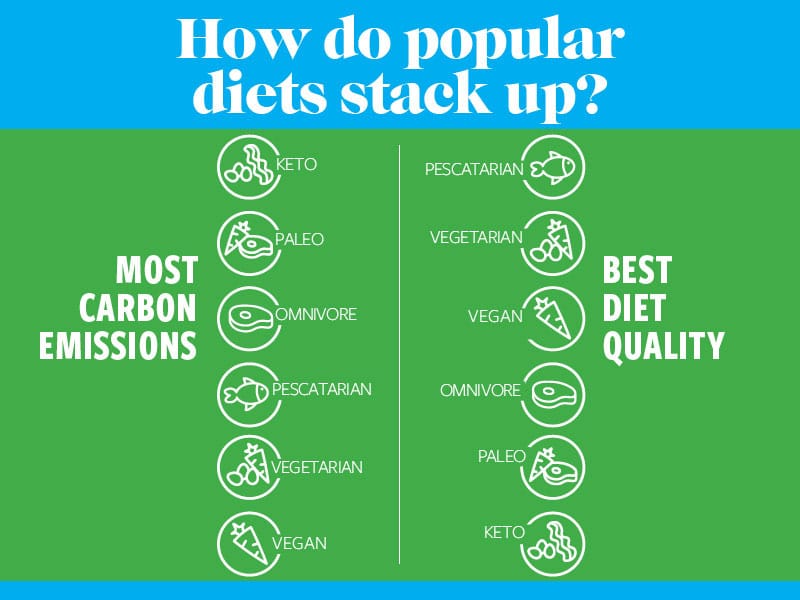
The worst for health and the environment, according to a comparative study
For environmental or health reasons, different diets are widely adopted for their supposed benefits. However, these are often the subject of debate. The results of a new study found that the ketogenic (or keto) diet and paleo diet, which are popular among Americans, were at the bottom of the ladder in nutritional quality and highest in carbon emissions. The palm of the best diet for our planet and our health goes to vegetarians, vegans, and pescetarianism. The latter would also be better for health, and signify that we can save the environment without having to cut out meat entirely.
According to the United Nations, 34% of greenhouse gas emissions come from the food production system. Large amounts of carbon are released every day along the entire value chain of this production, which in particular ranges from the farming or livestock system to the transportation systems that transport the products to the consumer. On the other hand, scientists have shed light on the harmful effects of a poor diet on health. Eating too much fat and too much sugar, for example, is closely linked to various metabolic syndromes, such as diabetes and obesity.
With the aim of healthy eating while preserving the environment, several increasingly popular diets have appeared in recent decades. Among the most widely adopted diets are the vegan, ketogenic, and paleo diet. The first is known for banning any animal-derived product, while the second recommends anything high in fat (fatty meats, avocados, dairy products, butter or nut oils, etc.), while limiting all sources of carbohydrates (rice, pasta, etc.). starches). On the other hand, the paleo diet approximates the diet one would have followed in the Paleolithic age, as its name suggests, and includes only unprocessed food.
Various researches have looked at the health benefits of these diets, but few have yet assessed their carbon footprint. Most databases on agroecological production only analyze the carbon footprint of different food products individually (raw or processed). The new study, which was led by the School of Public Health and Tropical Medicine at Tulane University in New Orleans (US), is believed to be the first to assess the carbon effects of ketogenic and paleo diets.
Experts in the new study in particular believe that these two diets have harmful effects on the environment, since they are rich in meat. In particular, the production of beef is responsible for 20 times more carbon emissions than the production of legumes and nuts. Moreover, these diets will be more designed and self-reliant, without the advice of real nutritionists.
Preserving the environment without cutting out meat?
Published in the journal American Journal of Clinical NutritionThe new study was based on data on the diets of more than 16,000 American adults. Their dietary scores were assessed using point values derived from the US Federal Healthy Eating Index. Information about the carbon footprint of each diet was evaluated against a database called DataField.
The researchers’ analyzes revealed that at the top of the list, in terms of carbon emissions, the ketogenic diet generates nearly 3 kilograms of carbon for every 1,000 calories consumed. Coming in behind is the Paleo diet, which emits 2.6 kilograms of carbon per 1,000 calories. At the bottom of the list is the vegan diet, which yields just 0.7kg for the same amount of calories.
Interestingly, the pescetarian diet, which prioritizes protein from seafood, would squarely follow a vegetarian and vegan diet in terms of reducing the carbon footprint. Getting the best results in terms of nutritional quality, this diet will be the right balance between wanting to eat healthy and protecting the environment. ” Our research shows there is a way to improve your health and carbon footprint without giving up meat entirely », underscore Diego Rose, MD, professor of nutrition and director of the Nutrition Program at Tulane University’s School of Public Health and Tropical Medicine, and lead author of the new study.

In terms of nutritional quality, fish farmers rank higher than vegans, while ketogenic and paleo diets would be the worst. The fiery diet — adopted by 86% of study participants — would be right in the middle of the pack, both qualitatively and environmentally.
However, it must be kept in mind that this study is relatively limited, since it is only of the United States. Indeed, because the accessibility of a product can be a major factor in its carbon footprint, the results of this assessment may be different for other regions of the world. For example, some have access to seafood products only through imports. So the carbon footprint of a vegan or pescatarian diet would be much higher.
source : American Journal of Clinical Nutrition

“Organizer. Social media geek. General communicator. Bacon scholar. Proud pop culture trailblazer.”
